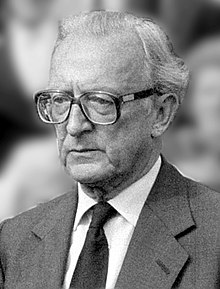Peter Alexander Rupert Carington, 6th Baron Carrington
|
The Right Honourable The Lord Carrington KG, GCMG, CH, MC, PC, DL |
|
|---|---|

Peter Carington in 1984
|
|
| 6th Secretary General of NATO | |
|
In office 25 June 1984 – 1 July 1988 |
|
| Preceded by | Joseph Luns |
| Succeeded by | Manfred Wörner |
| Secretary of State for Foreign and Commonwealth Affairs | |
|
In office 4 May 1979 – 5 April 1982 |
|
| Prime Minister | Margaret Thatcher |
| Preceded by | David Owen |
| Succeeded by | Francis Pym |
| Shadow Leader of the House of Lords | |
|
In office 4 March 1974 – 4 May 1979 |
|
| Leader |
Edward Heath Margaret Thatcher |
| Preceded by | Lord Shackleton |
| Succeeded by | Lord Peart |
|
In office 16 October 1964 – 20 June 1970 |
|
| Leader |
Alec Douglas-Home Edward Heath |
| Preceded by | The Earl Alexander of Hillsborough |
| Succeeded by | Lord Shackleton |
| Secretary of State for Energy | |
|
In office 8 January 1974 – 4 March 1974 |
|
| Prime Minister | Edward Heath |
| Preceded by | Position established |
| Succeeded by | Eric Varley |
| Secretary of State for Defence | |
|
In office 20 June 1970 – 8 January 1974 |
|
| Prime Minister | Edward Heath |
| Preceded by | Denis Healey |
| Succeeded by | Ian Gilmour |
| Chairman of the Conservative Party | |
|
In office 1972–1974 |
|
| Leader | Edward Heath |
| Preceded by | Peter Thomas |
| Succeeded by | William Whitelaw |
| Leader of the House of Lords | |
|
In office 20 October 1963 – 16 October 1964 |
|
| Prime Minister | Alec Douglas-Home |
| Preceded by | The Viscount Hailsham |
| Succeeded by | The Earl of Longford |
| Minister without Portfolio | |
|
In office 20 October 1963 – 16 October 1964 |
|
| Prime Minister | Alec Douglas-Home |
| Preceded by | Bill Deedes |
| Succeeded by | George Thomson |
| First Lord of the Admiralty | |
|
In office 14 October 1959 – 20 October 1963 |
|
| Prime Minister | Harold Macmillan |
| Preceded by | The Earl of Selkirk |
| Succeeded by | The Earl Jellicoe |
| High Commissioner to Australia | |
|
In office 1956–1959 |
|
| Prime Minister |
Anthony Eden Harold Macmillan |
| Preceded by | Stephen Holmes |
| Succeeded by | William Oliver |
| Parliamentary Secretary to the Minister of Defence | |
|
In office 1954–1956 |
|
| Prime Minister |
Winston Churchill Anthony Eden |
| Preceded by | Nigel Birch |
| Succeeded by | The Earl of Gosford |
| Parliamentary Secretary to the Minister of Agriculture and Food | |
|
In office 1951 – 1954 Alongside Richard Nugent |
|
| Prime Minister | Winston Churchill |
| Preceded by |
The Earl of Listowel Arthur Champion |
| Succeeded by |
Richard Nugent The Earl St Aldwyn |
|
Member of the House of Lords Lord Temporal |
|
|
Assumed office 17 November 1999 Life peerage |
|
|
In office 6 June 1940 – 11 November 1999 Hereditary peerage |
|
| Preceded by | Rupert Carington, 5th Baron Carrington |
| Succeeded by | House of Lords Act 1999 |
| Personal details | |
| Born |
6 June 1919 London, England |
| Political party | Conservative |
| Spouse(s) | Iona McClean (m. 1942; d. 2009) |
| Children | 3 |
| Alma mater | Royal Military Academy Sandhurst |
| Military service | |
| Allegiance |
|
| Service/branch |
|
| Years of service | 1939–1949 (inactive from 1945) |
| Rank | Major |
| Unit | Grenadier Guards |
| Battles/wars | Second World War |
| Awards | Military Cross |
Peter Alexander Rupert Carington, 6th Baron Carrington, KG, GCMG, CH, MC, PC, DL (born 6 June 1919) is a British Conservative politician and hereditary peer who served as Defence Secretary between 1970 and 1974, Foreign Secretary between 1979 and 1982, chairman of General Electric between 1983 and 1984, and Secretary General of NATO from 1984 to 1988. He is the last surviving member of the 1951–55 government of Winston Churchill, the Eden government, and the Macmillan government and of the cabinets of Alec Douglas-Home and Edward Heath. Following the House of Lords Act 1999, which removed the automatic right of hereditary peers to sit in the House of Lords, Carrington was created a life peer as Baron Carington of Upton, of Upton in the County of Nottinghamshire.
Carrington was Foreign Secretary in 1982 when the Falkland Islands were invaded by Argentina. He took full responsibility for the failure of the Foreign and Commonwealth Office to foresee this and resigned. As Secretary General of NATO, he helped prevent a war between Greece and Turkey in 1987.
...
Wikipedia
